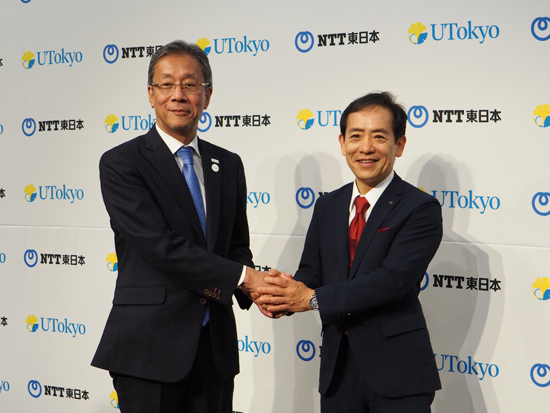Collaboration to realize a regional recycling-oriented society The University of Tokyo and NTT East

The University of Tokyo and NTT East have signed an industry-academia collaboration agreement with the aim of creating a next-generation digital network infrastructure that supports autonomous and decentralized regions and creating social entrepreneurs in order to realize a regional recycling-oriented society. Under the theme of “Connected Regions – A New Future,” both parties will take on the challenge of creating an autonomous, decentralized society in which each region can independently conduct its economic activities and daily life.
University of Tokyo President Teruo Fujii said, “As society as a whole moves by sharing various infrastructures, one of the major challenges is how to make them resilient. When thinking about the future of Japan, it is extremely important for NTT East and the University of Tokyo to create a decentralized system for society as a whole that allows people to pursue their own well-being while working autonomously. I would like to discuss this and put it into practice”.
Naoki Shibutani, president of NTT East, said, “I feel enthusiastic about our employees and students from the University of Tokyo going out into the field together to aim for an autonomous and decentralized society. On the other hand, an autonomous and decentralized society is not so easy, and there may be opposition from local residents. “Hitaru” is expressed as “Mamareru”, but by experiencing being tamed, we learn how difficult it is to change society.However, if we do it, society will change. “Do it.” By increasing the number of people who have this kind of experience, we will eventually create a sustainable society.I hope that the efforts of both parties will create a new trend for society as a whole”.
Although the agreement is for three years, the idea is to build a relationship that will last over the medium to long term. They hope to develop the relationship between the two companies on the theme of making the region sustainable by utilizing digital technology.
President Shibutani said, “Construction of IOWN’s APN will begin in the Tokyo metropolitan area and Kansai from the time of the Osaka-Kansai Expo in 2025, and will be expanded nationwide toward 2030. We envision rolling it out nationwide while creating use cases in cutting-edge fields”.
President Fujii notes, “Using IOWN, we can remotely control cryo-electron microscopes in near real time.We would like to pursue research in the biological field that utilizes IOWN, or applications in the medical field”.
